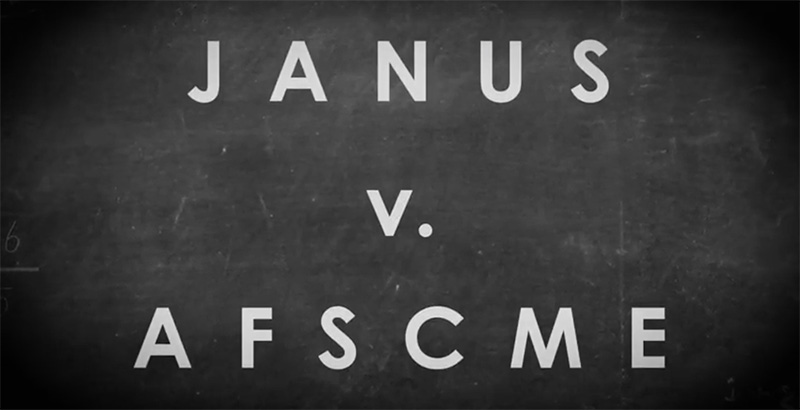Understanding Janus: 7 Articles to Read as Supreme Court Hears Pivotal Case on Public Worker Union Dues

Follow The 74’s D.C. correspondent Carolyn Phenicie on Twitter @cphenicie for all the action from the court Monday morning and check back with The 74 later that day for full details of the arguments, the protests, and reaction.
After months of debating the merits in lower courts and filing competing briefs, the day has arrived for attorneys to make their oral arguments before the Supreme Court in Janus v. AFSCME.
Mark Janus, a child welfare worker in Illinois, says it’s a violation of the First Amendment to force him to pay dues to a union whose policies he doesn’t agree with. Even the more limited, non-political dues that dissenters have paid since the 1970s, which fund traditional union activities like collective bargaining, are inherently political, Janus and his lawyers argue, because public policy and the taxpayer dollars are on the line.
Unions maintain that so-called agency fee dues are fair and necessary to prevent “free riders” from reaping the advantages of union contracts without paying, and make it easier for governments to negotiate with one representative of public employees.
Get started with the basics of the case, then check out these six articles to get you up to speed while the justices deliberate on what’s expected to be a landmark case. A decision is expected in late June.
Collective bargaining impacts — Many education reformers hope that an end to mandatory dues means weakened union power, and an easier path for union-opposed policies, like ending “last-in, first-out” layoff policies or expanding school choice options. But the example from a number of states that have recently ended mandatory dues, like Wisconsin and Michigan, doesn’t provide a clear crystal ball, as they also changed key collective bargaining rules at or around the same time as ending dues.
What’s Janus? — Despite dire warnings from union leadership, rank-and-file teachers in New York City, home to the one of the most influential teachers unions in the country, the United Federation of Teachers, were largely in the dark as of late last month, though union leadership has kicked up its public awareness campaign in recent weeks.
Next up, Yohn — California middle school social studies teacher Ryan Yohn has his own case pending in lower courts. He, like Janus, argues that mandatory dues violate the First Amendment. But Yohn and his attorneys also say that forcing dissenting teachers to opt out of full union membership, as the system holds now, rather than requiring members to actively opt in, is also a violation of the Constitution.
Unions prep for membership decline — Columnist Mike Antonucci looks at the biggest state and national teachers unions, and how they’re preparing for a drop in membership if the Supreme Court overturns mandatory dues. The 3 million–member National Education Association predicted a drop of 200,000 members this school year, while the California Teachers Association expects to lose as much as 30 percent to 40 percent of its 325,000 members.
Feds switch sides — The federal government filed a brief last month siding with Janus, after the U.S. solicitor general’s office in the Obama administration had sided with unions in a similar 2016 case. That stance, the Trump administration said, “gave insufficient weight to the First Amendment interest of public employees in declining to fund speech on contested matters of public policy.”
Union competition? — Teachers unions have for decades had agreements not to raid each other’s members, and there was little reason for members forced to pay dues to one union to join a second, even if they were unhappy with their existing option, Antonucci wrote. Now, though, educators would have the option to join a different union, create a splinter group, or join a non-union professional association, setting up a new competition.
Get stories like these delivered straight to your inbox. Sign up for The 74 Newsletter

;)
